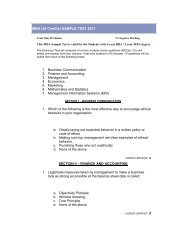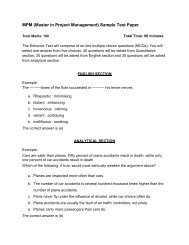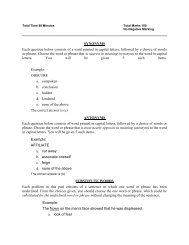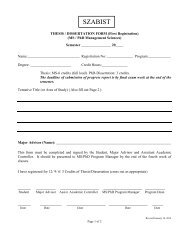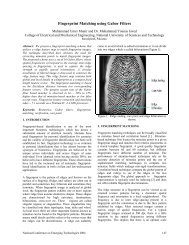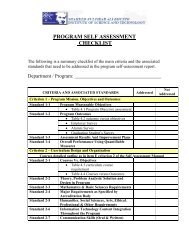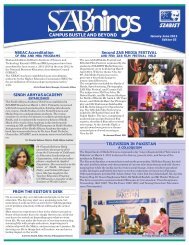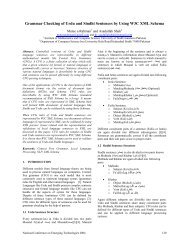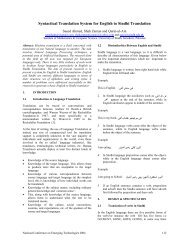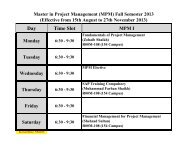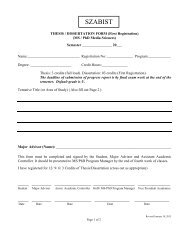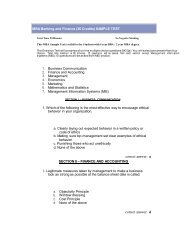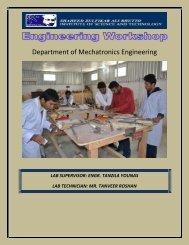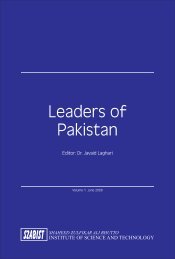Benazir Bhutto - SZABIST
Benazir Bhutto - SZABIST
Benazir Bhutto - SZABIST
Create successful ePaper yourself
Turn your PDF publications into a flip-book with our unique Google optimized e-Paper software.
My BB, my boss<br />
Shafqat Mahmood<br />
Prime Minister <strong>Benazir</strong> <strong>Bhutto</strong> was an iconic figure long before I met her for the first time in<br />
November 1989. Those of us who despised the Zia dictatorship had cried at the memory of this young<br />
woman's tearful last meetings with her father and the trauma she had endured on his judicial murder.<br />
We also admired the fortitude and courage with which she had stood up to the dictator and bravely<br />
faced imprisonment and solitary confinement. And, when she came back to the country, we had lived<br />
through the joy of her triumphant return and the victory of her party in 1988.<br />
I remember tears in my eyes when she took oath as Prime Minister because it seemed that evil had lost<br />
and good had won and a new chapter was about to begin and that never again would dictators rule this<br />
land and that this young and fragile looking women would take our nation forward and replace despair<br />
with hope and bring light where darkness had ruled. I remember that as soon as the ceremony was<br />
over, the TV played a recording of Faiz's 'bahar aaee to mit gaye hein azab saray' and amid more tears,<br />
emotions of joy welled up in my heart and after a long time I felt proud to be a part of nation that had<br />
produced a leader like <strong>Benazir</strong> <strong>Bhutto</strong>.<br />
Imagine then my nervousness when I was ushered in, a mere grade 19 civil servant, to meet her in the<br />
Prime Minister's office in the State Bank building in November of 1989. Sardar Maqsood Khan<br />
Leghari had made this happen and I sat quietly while he spoke. Mohtarma was sitting looking at some<br />
files while listening to him and I felt here was my chance to impress her and perhaps get a chance to<br />
work for her, so with shaking knees, I started to give her my take on the situation in the country. I<br />
don't think until then she had noticed me at all but when I started to speak, she probably thought that I<br />
was making some sense because she put on her glasses and started to listen carefully. She immediately<br />
ordered that I be posted in her secretariat and thus began an association that was to last seven years.<br />
For someone untutored in the ways of high politics, it was both exciting and a surreal experience. Just<br />
a few days after I had take charge, I wrote her a note on the politics of Punjab and she called me to the<br />
Sindh House, which was then the Prime Minister's residence, to discuss it. As I started to brief her, she<br />
turned on a small radio to a station playing 'pahari' music of the Potohar region. This surprised me and<br />
she saw me giving it a strange look. She smiled and started pointing her finger towards the roof and<br />
the walls. It took me a few seconds to realise that she was telling me the room was bugged. For a mid<br />
level civil servant sitting with the Prime Minister of the country this was a sobering welcome to the<br />
tortured world of power in Pakistan.<br />
It soon became obvious to me that she was not only trying to solve some of the serious problems<br />
facing the country but she was fighting an internal battle against the establishment and its intelligence<br />
agencies who were trying to destabilize her. Those of us in her personal staff were immediately<br />
sensitized to this danger and started to be very careful about what we said or wrote. This internal battle<br />
was brought home to me when the Sindh government launched the pucca qilla operation in Hyderabad<br />
in 1990.<br />
This was a police action designed to unearth a large quantity of arms hidden in this redoubt in the city.<br />
As the police reached near the main arsenal, the army intervened and stopped the operation. A day<br />
later, I flew with her to Hyderabad and the local administration was very clear that this intervention<br />
was only designed to thwart their finding a large quantity of arms and ammunition hidden there. I<br />
remember asking her whether anyone in the army had sought her permission or that of the Sindh<br />
government. The answer was in the negative. The Army commander General Aslam Beg had done<br />
this, to stop the terrorists from being exposed.



